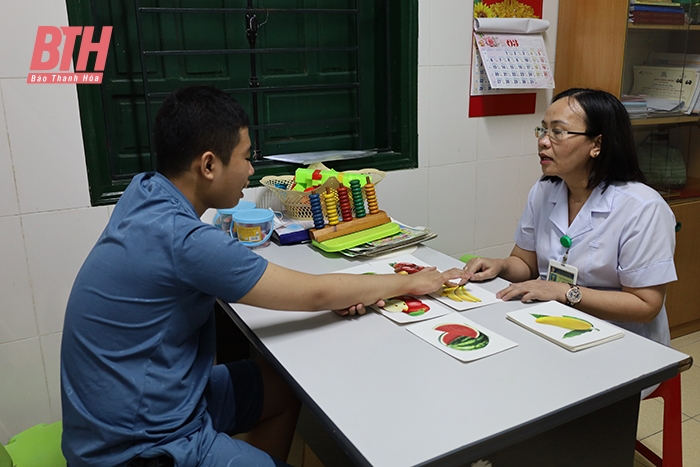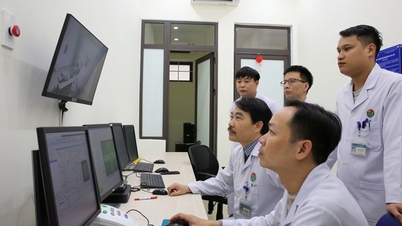For the doctors at the Mental Hospital, love for the profession, expertise, and good skills are not enough to help doctors enter the "private world " of patients. They also have a "spirit of steel", patience, determination mixed with kindness and understanding of patients. This helps doctors understand the root cause of mental illness so that the treatment of patients can be more effective.

Being present at Thanh Hoa Mental Hospital, witnessing the care and treatment of patients by the medical team, I realized that treating mentally ill patients is many times more difficult than treating normal psychological patients. Doctor CKII Nguyen Thi Tham, Head of the Department of Clinical Psychology - Pediatrics shared: Mental illness is not necessarily crazy as people often think. This is the general name for hundreds of diseases related to nerves and psychology due to the influence of many different causes, such as: genetics; encountering mental shock or being under some pressure that causes the disease. People who have to be treated at the hospital often have severe depressive disorders, schizophrenia, mental retardation, epilepsy, senile dementia, ... often cannot control their behavior and speech and fall into a state of strong agitation. In these cases, contacting and treating the disease is extremely difficult, arduous, and even very dangerous.
Dr. Nguyen Thi Tham has been in the profession for more than 28 years. From a timid and fearful fresh graduate, Dr. Tham has gradually become sympathetic to the lives of patients. And now, Dr. Tham has become a spiritual support for many patients and their families. In Dr. Tham's mind, mental patients are the most vulnerable group in society. For some reason in life, they go crazy, unable to control their behavior and emotions. At first glance, they can be scary. But after spending time with patients, talking to them during their illness as well as during their quiet times - when they are normal, I see that they are pitiful and need a spiritual support to relieve the suffocation in life.
From empathy and understanding of patients, Dr. Tham determined not only to strive to improve professional expertise but also to practice patience and calmness when dealing with patients. Because, patients here do not suffer from emergency diseases or acute infections, but they suffer from mental illnesses, need time to talk and confide in order to understand the patient's personality and personality as well as exploit the surrounding factors that affect the patient. Therefore, during the examination of patients, Dr. Tham often pays attention to observing the patient's state, eyes, and gestures to find a way to talk appropriately with each patient. This helps patients feel trust, safety and comfort when dealing with doctors, seeing the doctor as a friend to confide in.
Present at the Geriatrics Department, I witnessed the image of a male doctor not only examining and monitoring the patient's heart rate and blood pressure, but also assisting the patient in eating, personal hygiene, etc. Doctor CK1 Bui Hai Trieu, Deputy Head of the Geriatrics Department, said: Medical staff play the role of relatives of the patient. Because the patients here are mainly elderly, many of them do not have relatives, and are not alert enough to perform daily activities. In some cases, there are relatives but they are only legal representatives and not strong enough to support the patient because the caregiver is also old. Therefore, doctors and nurses often have to take care of and coax the patient to eat enough meals, sleep on time to ensure health during treatment; assist the patient in changing diapers, going to the toilet, moving to ensure safety, avoiding collisions and falls that make the disease worse.
In addition to taking care of patients, the doctors here also spend many hours listening to patients talk, even about unclear or repetitive matters, or sitting and chatting to resolve the problems in the hearts of patients who are always quiet and quiet. Following Dr. Trieu into a hospital room where the patient did not cry, did not laugh, did not speak, just sat there pensively, eyes wide open, looking at the sky and the ground. He talked for a long time with the male patient, but only received nods in return. This patient was a teacher, about 50 years old, due to work pressure, he became ill. When he was hospitalized, he did not talk, did not laugh, did not eat, did not take medicine, did not cooperate. Every time it was time to eat, Dr. Trieu and the doctors and nurses in the department took turns encouraging and supporting the patient to eat. Every day, they spent time talking with the patient to gain sympathy and trust from the patient. After more than a month of treatment, the patient gradually cooperated with the doctor, ate, slept and took medicine. Doctor Trieu shared: No matter the circumstances, medical staff must not be irritable or angry with patients. In particular, they must not let the impacts from patients such as: screaming, singing, crying, or aggression, vandalism affect the doctor's psychology and state. As a doctor working at a Mental Hospital, not only do you need to focus on expertise but you also need to train a "spirit of steel".
For some people, mentioning the Mental Hospital may be intimidating, but the team of doctors and nurses working here are always dedicated, wholehearted and sympathetic to the stories and situations of the patients. They are doing something that few people dare to do, which is to sow hope and create belief in a normal life for special patients.
Article and photos: Thuy Linh
Source













































































































Comment (0)